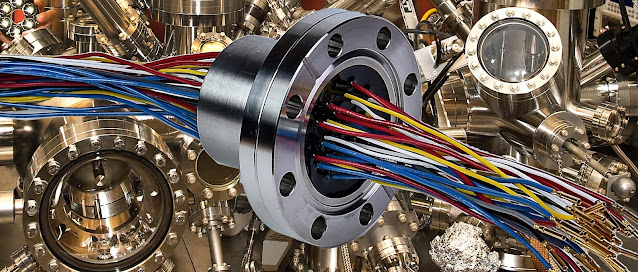While quite different in construction style and application, the terms vacuum feedthrough, hermetic feedthrough, and electrical feedthrough are often used interchangeably by engineers, researchers, and scientists. No matter what they are called, they have the common purpose of allowing electricity, light, gas, or liquid to pass though a vacuum chamber's walls. The following are descriptions of several of the most common kinds of vacuum feedthrough:
A fiber optic feedthrough transfers emitted light through a fiber optic cable into vacuum apparatus They provide a simple way to use optical fibers with vacuum chambers. They are available with flanged or screwed connections.
An electrical feedthrough carries some form of electrical energy into vacuum apparatus. The feedthrough usually has a single set. or multiple sets, of electrical conductors. These conductors can be pins, standard types of connectors, or lead wires.
Liquid and gas feedthroughs are used to carry liquids of gases in and out of a vacuum apparatus. The transfer is normally done using stainless steel tubes with epoxy-to-metal, ceramic-to-metal, or via an embedded compressing fitting.
A thermocouple feedthrough is used for temperature measurement in vacuum applications. These feedthrough carry temperature instrumentation signals into vacuum apparatus while providing electrical isolation and a hermetic seal. They are leak free in vacuum environments and can be supplied in most thermocouple calibrations, such as Type J, K, T, E, R, S, etc.
BCE, a Northern California based manufacturer of precision vacuum feedthroughs has a convenient vacuum feedthrough configuration tool here.
For more information on vacuum feedthroughs, contact BCE. Phone them at 510-274-1990 of visit their site at https://bcemfg.com/feedthroughs.





